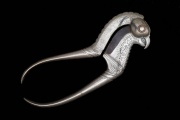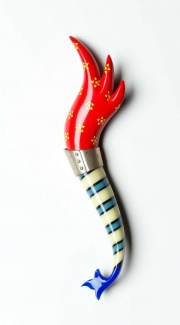White metal
Description
1) A soft metal alloy containing over 50% Tin. White metal originally contained tin (92%) and Antimony (8%), with small amounts of Lead or Copper. This mixture has a melting point of 246 C. The term is now used for any low melting alloy that contains tin with lead, or antimony. Examples are Babbitt metal, Pewter, and Britannia metal. White metal is used for bearings and in the casting of costume jewelry.
2) Name for iron arsenosulfide commonly used prior to the 1800s when chemical compound names were standardized (Schur, 1985).
3) An intermediate product (Copper sulfide) obtained during the conversion of copper matte to blister copper.
Synonyms and Related Terms
1) anti-friction metal; Babbitt metal; Britannia metal 2) iron arsenosulfide 3) copper sulfide; métal blanc (Fr.)
Additional Information
O. Untracht, Metal Techniques for Craftsmen, Doubleday and Co., Garden City, NY, 1968.
Sources Checked for Data in Record
- G.S.Brady, Materials Handbook, McGraw-Hill Book Co., New York, 1971 Comment: p. 871
- Richard S. Lewis, Hawley's Condensed Chemical Dictionary, Van Nostrand Reinhold, New York, 10th ed., 1993
- Susan E. Schur, Conservation Terminology: A review of Past & Current Nomenclature of Materials, Technology and Conservation, Spring (p.34-39); Summer (p.35-38); Fall (p.25-36), 1985
- Wikipedia, the free encyclopedia, at http://www.wikipedia.com Comment: http://en.wikipedia.org/wiki/White_metal (Accessed Mar. 20, 2006)

